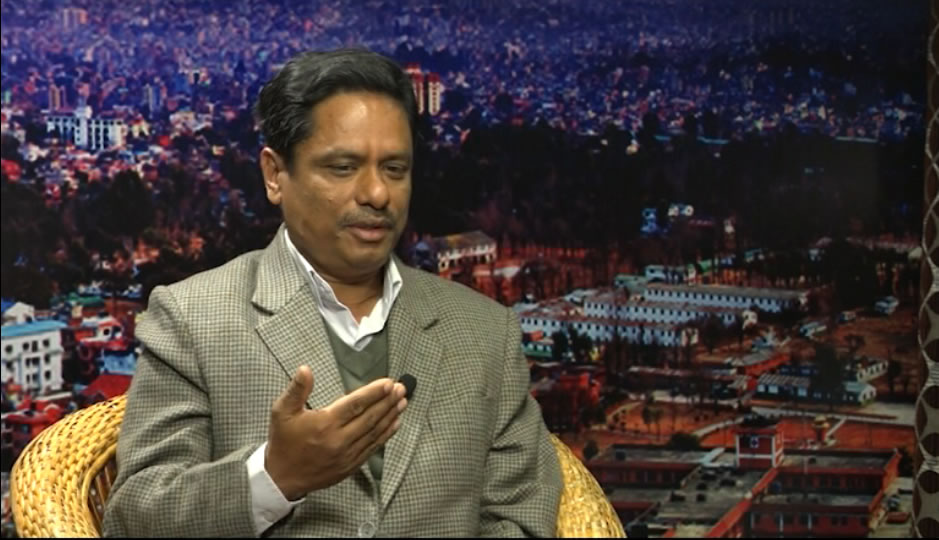 “Guidelines to manage human waste is urgent”
“Guidelines to manage human waste is urgent”
- Prem Krishna Shrestha, Chief, Environment Sanitation Section, DWSS
1. What is the government policy on Fecal Sludge Management now?
Number of houses rises and people started using toilets at homes. We still don’t have any strict rule that human waste should not be drained to river without treating the water. Only that the Local Self-GovernmentAct has one provision that religious rivers cannot be polluted.
There has been no policy on FSM it till now. Process is going on for policy intervention on FSM. The municipalities have made it mandatory that all new houses to be built need to have septic tanks.
All laws are made when necessity is felt. In the past people didn’t have toilets and fields were enough for nature’s call. Some decades ago, people used to take bath in the Bagmati and Manahara river. And the water river used to be considered as sacred. Only later people started making toilets and need of septic tank was felt.
We have felt that it is late now. We need to start taking this seriously. Now the government should make laws that the municipalities can drain waste water in rivers only after meeting certain parameters of pollution. For example, industries cannot rain water which does not meet the parameter but there is no such guidance for municipalities for draining sewage. Then we can talk about either strengthening sewerage or implementing FSM.
2. What should be done at the best to manage fecal sludge?
Rules are made only when we feel the problem. For example, we care about locking our doors only when we realize that thieves may come. We are just at the beginning of the process. Now, this is the time to come up with some strong provisions on this.
First the municipalities should make rules for themselves. Septic tanks should not dumped every where. A standard is being a guideline is being made from the department.
Now, the Department of Water and Supply Sanitation has developed a draft of FSM guidelines. A standard is being developed; a guideline is being farmulated at the department. It will take some time before it is approved by the ministry.
3. What is the need of FSM in Nepal’s present context?
Kathmandu has sewerage system and FSM may not be necessary here. But the system does not cover all houses. Due to our terrain, sewerage network cannot cover all areas. It is especially necessary in emerging towns and cities.
There are some reasons we need to emphasize on FSM. First, where there is no sewerage system, there we need to apply FSM as an intermediate technology till the date it fully is equipped with sewerage system.
There are toilets and the thing those toilets produce need to be treated, if we don’t want to pollute our earth. Till now, we just transform the problem - from the houses to the river. FSM has come with a message, that is, let’s not only trans form the problem but solve it also.
There are toilets and the thing those toilets produce need to be treated, if we don’t want to pollute our earth. Till now, we just transform the problem - from the houses to the river. FSM has come with a message, that is, let’s not only trans form the problem but solve it also.
In this situation, as an intermediate technology, for coming 15 to 25 years, we need to go for FSM to solve the growing problem right now. By this, we can solve this problem of urban development much quickly.
In sewerage system, water carries all human waste to the treatment plant. In FSM, the sludge is stored in septic tank in each house and the sludge is taken, with the help of a kind of vehicle, to the treatment plant.
On the other hand, even when we have modern sewerage system, FSM can be implied as a supplementary technology. In our kind of terrain, all houses cannot be linked to the network (unless we pump it up). Those remaining houses need separate treatment of the sludge.
4. Are people for or against FSM here ?
Yes. There is a debate on whether we need FSM or not.
One group advocates for FSM as necessary and cost-effective method to manage human waste. Another influencial think that FSM is only imported technology and they stand for strong sewerage. They say that sewerage is the ultimate system and want the sewerage to take away all kinds of human waste.
Apart from this, some are extremists, who say that sewerage is not necessary and FSM is enough.
5. What is your personal opinion about FSM?
I am studying FSM. I say that sewerage is a very expensive technology. We cannot keep our country to this situation. We now imagine that our country will be like Singapore and Japan. We need sewerage ultimately, taking all waste water to treatment plant and only treated water is drained in the river so that the river remains clean always. This is an imagination of common Nepali. But for this, we need large amount of capital investment and it takes time.
But to make the dream come true, we need to work on reality basis. At present, when we don’t have sufficient budget and the need of management of human waste is so urgent, we need to go for FSM right now.
Source: Water Discourse Vol. 1 Issue 1 February 2017